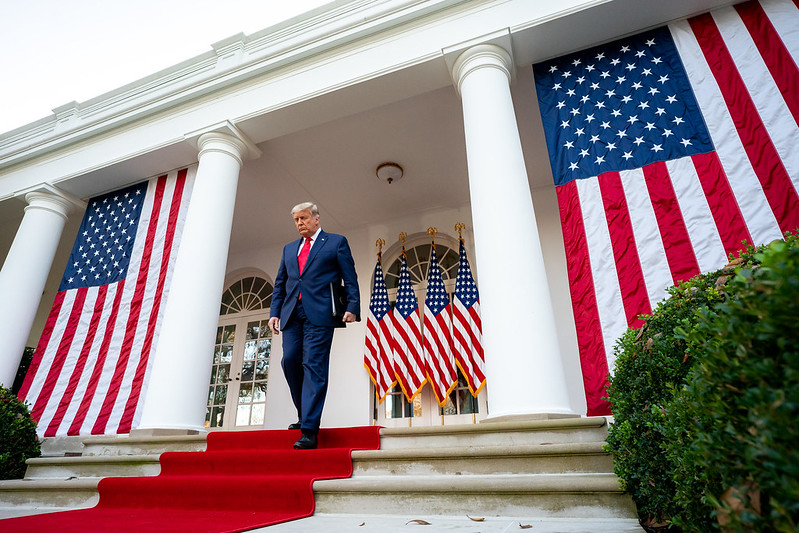Democrats have backed themselves into a political corner of historic proportions by repeatedly rejecting the clean continuing resolution Republicans have put on the table day after day. The track record for government shutdowns is about as grim as a broken roulette wheel in a backroad casino — and the outcome is always the same. The house, or in this case the White House, always wins.
Presidents hold the cards during shutdowns because they decide what’s “essential,” where funds can still flow, and how pain gets distributed. Democrats know this better than anyone — which is exactly why, in the past, they’ve avoided shutdown brinksmanship altogether. Yet here they are, gambling with political dynamite and pretending it’s strategy.
Fresh off a major diplomatic victory in the Middle East, Trump returns home to confront the Schumer Shutdown with a far stronger political hand. But it’s not just momentum he’s bringing back — it’s leverage.
Trump’s foreign policy success has given him a level of fiscal and geopolitical strength that few presidents have ever had during a shutdown fight. While past leaders were bogged down by global instability and economic fragility, Trump’s decisive approach abroad has left him uniquely positioned to weather the storm — and to remind Americans that real leadership delivers results both at home and overseas.
As noted by Punchbowl News:
The White House is girding for a long shutdown and has found several new funding streams for critical programs, according to top Trump administration officials.
— The Office of Management and Budget is “working on ways” to get paychecks to federal law-enforcement officers, according to an administration official. This is similar to what Trump ordered over the weekend for 1.3 million active duty military service members.
— The Trump administration will ensure the Special Supplemental Nutrition Program for Women, Infants, and Children — known as WIC — can continue to operate for the foreseeable future, a White House official said. The administration says it will use hundreds of millions of dollars in Section 32 tariff revenue. This is a vital nutrition program that serves more than six million participants per month, including 40%-plus of U.S. infants.
In past shutdowns, presidents have always had access to alternative funding streams — tariffs among them. Despite all the hand-wringing and media hysteria over the past several months, tariffs have been a standard part of U.S. trade policy for centuries.
What sets this moment apart is how President Trump has leveraged them. He’s expanded tariffs not just as an economic tool, but as a key component of his foreign policy — and it’s paying off. Right now, those tariffs are giving his administration far greater financial flexibility than his predecessors enjoyed, allowing him to keep popular programs running while pausing others.
It’s the kind of strategic advantage only a president who understands both business and diplomacy could pull off.
What’s the catch? Well, the growing use of executive tariff power does tilt the balance away from Congress — and that’s no small thing. The Constitution intentionally gave the legislative branch control over tariffs because, at the time, they were the federal government’s main source of revenue. The idea was simple: Congress controls the purse strings.
But over the decades, lawmakers have gotten comfortable dodging tough votes and outsourcing responsibility. Through a series of statutes, they handed more and more tariff authority to the executive branch — and President Trump is now using those very powers to bypass congressional gridlock and secure revenue streams that operate independently of the legislature. The Supreme Court plans to take up this very question in its current term, but not soon enough to save Chuck Schumer from the corner he’s boxed himself into.
With this enhanced revenue flow and OMB Director Russ Vought’s sweeping cuts to tens of thousands of government jobs, Trump and Republicans can easily afford to wait Schumer out. In fact, Punchbowl News reports that Schumer’s bluster is only hardening GOP resolve — leaving Democrats with little more than talking points while Trump holds the cards:
But the White House seems very comfortable with its position and is preparing for an extended shutdown. They’re citing comments from top Democrats, including Schumer, who told us last week that “every day gets better” for Democrats’ shutdown strategy, as a reason to keep going.
Also, Schumer’s incoherence doesn’t help his case either, notes Charles C.W. Cooke at NRO:
If Republicans “own this shutdown” because they “control the Senate, the House, and the White House,” then why would they need to “come to the table” to “sit down and negotiate with Democrats to reopen the government”? Those two things cannot simultaneously be true. Either the Democrats are using the leverage they have to shut down the government so that Republicans can’t “[take] health care away from you,” or the Democrats are helpless bystanders watching the Republicans keep Washington D.C. closed just to be mean. But they can’t be both. …
In effect, Schumer’s message is, “The Republicans did this, and can end it at any moment; but also the Democrats did this, and we won’t give in until we get what we want; and also the Democrats are using the filibuster to fight for what’s right, and, if they were decent, the Republicans would take that tool away from us.”
These glaring contradictions — combined with Democrats’ weak strategic position — make it unlikely this shutdown standoff will drag on much longer. President Trump is returning to the U.S. fresh off a major diplomatic triumph, and that only makes Chuck Schumer’s refusal to pass a clean continuing resolution look even smaller and more politically tone-deaf.
Most top Democrats won’t even acknowledge Trump’s pivotal role in freeing the hostages from Gaza or in brokering a ceasefire that ended a two-year war dominating global headlines. Their silence makes them look petty — more like bitter partisans bickering over a budget than serious leaders dealing with the aftermath of a historic peace achievement.



